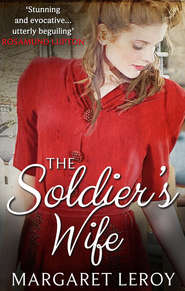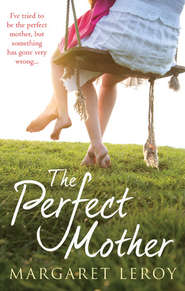По всем вопросам обращайтесь на: info@litportal.ru
(©) 2003-2024.
✖
The Drowning Girl
Автор
Год написания книги
2018
Настройки чтения
Размер шрифта
Высота строк
Поля
Right from the beginning, I did just what he said.
He stuck the plaster in place with rather excessive thoroughness, but I wasn’t going to move away. He had a faint scent of leather and cigars, a very male scent. His closeness felt extraordinary, thrilling with a shiver of sex, yet somehow safe too, as though he were familiar to me, as though I knew him already. I felt how much bigger he was than me. I liked that.
‘Better now?’ he said.
‘Yes. Thank you.’
He stood back a pace and smiled at me. A sudden smile of startling candour, with on one side of his mouth a little crease. It’s weird thinking about this now. It’s Sylvie’s smile exactly. Where his hair was starting to recede, the skin had a vulnerable look—I wanted to reach up and touch it. The thought sent a clear bright line of sensation through me.
‘So. Grace. I think you should have a coffee. After losing all that blood.’
‘Thanks,’ I said.
‘You do drink coffee, don’t you?’
I nodded.
‘That’s a relief. Claudia’s into this foul herbal stuff. Camomile. It’s like hay. Why would anyone drink hay?’
I felt he was telling me too much, giving too much away—that he shouldn’t be criticising her like this to me, a stranger, even about such a very trivial thing.
While the kettle was boiling, he found a place for the flowers on the mantelpiece.
‘Good flowers. Did you do them?’
‘Yes.’
‘They’re rather lovely,’ he said. ‘Well, you look the arty type. I can tell from the stripes.’ He gave my legs an appraising look.
We drank our coffee. Somehow he learnt a lot about me.
When I left he asked would I be OK to drive, and I said I was fine, I didn’t feel faint in the least—though that wasn’t true exactly. Two days later, he rang the shop and asked me out to the Alouette for a meal, where he effortlessly seduced me.
Eventually I find number 43, down an alleyway. The man who opens the door is unshaven and in his pyjamas. Hot air from a sick room brushes against me, with a smell of camphor and stale sheets. He’s embarrassed, seeing me there. It must all have been going on for a while: the house is rearranged to accommodate his illness. I can see the living room behind him, with the sofa made up as a bed. There’s opera on the stereo, a vigorous soprano, her voice pulsating with passion. The contrast is saddening—the music with its fabulous energy and emotion, and his wasted, restricted life.
For lunch I buy baguettes from Just-A-Crust. On the way back, as always, I linger outside the patisserie on the corner. They sell the most wonderful cakes there, all decorated with jewelled marzipan fruit, and with names that sound like the names of beautiful women. We eat our baguettes in turn in the back room.
The afternoon passes slowly. At three Lavinia goes out for a walk and a smoke.
Just after she’s gone I see a woman approaching the shop. She’s in her seventies perhaps. She’s wearing a crisply cut jacket, her hair is a lacquered grey helmet, her eyebrows are plucked and thinly pencilled in. Everything about her is polished and exact. Seeing her, it enters my mind that this grooming has a defensive purpose for her—as though this slick, varnished surface will somehow keep her safe. I watch as she draws nearer, tapping along the pavement on her pointy shiny shoes. At the door she hesitates, just for a heartbeat, then clears her throat, walks determinedly in. I know what she’s come for. I feel a brief apprehension. I wish Lavinia were here.
The flowers are for her husband, she says.
‘The funeral director said he’d take care of it all, but I wanted to choose them myself. It seemed important somehow.’
Her hands are clasped tight in front of her. I can feel the tension in her, her fear that she might come undone.
I bring her a chair and show her our catalogue. But she can’t choose. The decision has too much importance: it’s as though she believes that if only she can choose with absolute precision, everything will be mended and she’ll somehow bring him back. I understand: I’ve felt that.
I turn a page of the catalogue. A photo catches her eye.
‘Maybe something with cornflowers,’ she says. ‘They were his favourites. He always loved that blue.’
She looks away then, her eyes fill up, the tears spill down her face. The massive grief washes through her; there’s nothing she can do. She’s embarrassed but can’t stop it happening. Tears make glossy streaks in her thick cake make-up. I’m relieved for her that the shop is empty. She’s a private person; I know how she hates this extravagant public display.
‘I’m going to bring you a drink,’ I tell her. ‘You just sit there till you’re ready. We’ve got all the time in the world.’
I go to the back room and make her a coffee. Her grief has got inside me; my hand shakes, holding the spoonful of coffee, the soft brown powder sifts down.
She’s grateful. She wraps both her hands around the mug, as though needing something to cling to, as though the world seems insubstantial to her. She tells me about her husband. He was diabetic, he’d been taken into this nursing home—it was just for a week, she’d felt she needed a rest—how could she have been so selfish? They didn’t do his blood sugars properly, not as she’d have done. It’s all her fault he died…
I listen, not saying much, not comforting her, or telling her that everything’s OK: I know that wouldn’t help. And when we’ve chosen the wreath, I take her to the back room so she can tidy her face, because I can feel that matters to her.
‘Bless you,’ she says when she goes.
Her grief hangs around in the shop for a while, pressing down, a heaviness. I think of my mother’s death, of sitting in the crematorium chapel, feeling that empty swing of sickness through me, thinking about her life and all its limitations—the bitterness that had never left her after my father walked out: and that now it would never get better, now she was out of time. The bleakness of that.
We close at five-thirty. We mop and tidy up, and I peel off my soggy gloves and hang them by the boiler.
‘You get yourself an early night,’ says Lavinia as we leave.
‘I’m all right,’ I tell her.
Her eyes rest on me a moment, but she doesn’t say anything more.
CHAPTER 3
There are several different routes to Sylvie’s nursery. I take the one that goes down Newgate Road. I know I shouldn’t do this. The decision is made somewhere deep inside me, almost without conscious thought.
I park a few yards from the house. The darkness is thickening; no one will see. I’m invisible here, a faceless person, a shadow in the street. I wind my window down an inch; there’s a cold scent of autumn, a tang of smoke and rotten leaves, and the high, sharp bark of a fox. I tell myself I’ll only stay a moment.
The blinds are still up in the drawing room that faces onto the street, and tawny lamplight spills across the paving in the garden. Tonight I’m lucky: Dominic’s car is here; he must be at home. In the room, you can see all the things that Claudia has chosen—the subtle grey shades of the walls, the sketches in thin metal frames, on the mantelpiece a single orchid, of a cool watery green. The room seems so enticing in the mellowness of the light. I suddenly feel how cold I am, sitting here, still chilled from the day. I wrap my arms tight around myself to try and stop myself shivering. I feel a deep, dangerous loneliness.
As I watch the drawing room, Charlie, their son, saunters in. He’s still in his school uniform, but rumpled, his shirt hanging out. He’s tall now, visibly taller every time I see him, coltish, his hands and feet too big for him, a pale thatch of hair on his head. He looks around vaguely for something, then ambles out of the room.
I feel the quick fever of excitement that always comes over me here. I wonder if I will see Dominic.
But it’s Claudia who comes in. She walks right up to the window, which is a little open, and leans out, her arms on the sill. If she looked really hard she might see me now, but I’m sitting quite still in the shadow—and anyway, would she even know who I am? Does she know about me and Sylvie? Dominic never told me, there’s so much he never said. She lingers there for a moment. Maybe like me she’s just breathing in the scent of rot and bonfires, the smell of approaching cold that paradoxically seems so full of promise. Then she closes the window and reaches up to pull on the cord of the blind. Her head is back, and briefly the lamplight catches on the arch of her throat and the bright blonde fall of her hair. She’s thin; she has a figure that speaks of Pilates classes and always being a little hungry: her arm looks angular, stretching up, the amber brightness gleaming on the bony curve of her wrist. Then the blind slides down.
I watch for a moment longer. There’s another shape in the room now, a shadow choreography behind the blinds. But the shapes are vague, indeterminate—it’s Charlie again, perhaps, or Maud, their daughter: I can’t tell whether Dominic is there. I think of this life of his that I am excluded from—that I was always excluded from, even when we were closest. The everydayness of him that I know nothing about. What he’s like at family mealtimes, or at dinner parties with friends, or kicking a football around with Charlie in the garden. I never knew him doing any of these things. I knew him only as a lover: tender, passionate, curious, in those lavish afternoons we’d spend together in my bed, when I’d feel a complete, exact pleasure in his insistent fingers, his easy, deep slide into me, the sweet assiduous movement of his mouth. Or cool, closed-off, rejecting, in that terrible moment at the Alouette, the moment we couldn’t get back from. I’d been taking antibiotics for cystitis, but I hadn’t known that antibiotics could interfere with the pill. I told him I was pregnant, saw the instant retreat in his eyes. Cold crept through me. His look told me everything: his narrowed eyes, the way he stared at me as though I were his enemy. I knew the whole thing was fractured before he started to speak—explaining in his measured voice that of course I’d want to get it done privately, that he knew a good gynaecologist, that naturally he’d pay.
A familiar nausea rises in me. I sicken myself. I cannot live like this—parking near his house, ringing him just to hear him on his voicemail. Looking in on another life that isn’t mine, that can never be mine. This is wrong, I know that. I’m bitterly ashamed of it. I’d never admit to anyone—Karen, Lavinia—that I do this. I try to move on but nothing seems to work for me—the introduction bureau, the speed-dating evening at Crystals nightclub—none of it gets me anywhere: no other man seems quite real. They’re too young, too insubstantial, they don’t overwhelm me as he did. I have to make myself like them, check off their good points. Like with a man I met at Crystals, who seemed to have an interest in me, I spelt it all out in my head—his perfectly ironed white shirt, his floppy Hugh Grant hair, his smell of soap and cologne. Trying to convince myself.
I resolve that this is the last time. I promise myself I will never do this again—never, never. I drive off rapidly, but the nausea doesn’t leave me.
At the nursery it’s Beth who lets me in. She’s arranging the children’s artwork on a table ready for home time. She’s Sylvie’s favourite assistant: she has curly hair haphazardly pinned up, and warm brown eyes.
She smiles at me.









